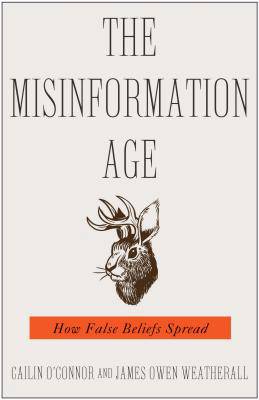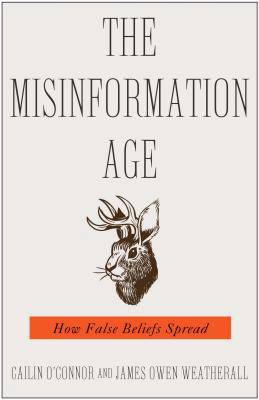
Bedankt voor het vertrouwen het afgelopen jaar! Om jou te bedanken bieden we GRATIS verzending (in België) aan op alles gedurende de hele maand januari.
- Afhalen na 1 uur in een winkel met voorraad
- In januari gratis thuislevering in België
- Ruim aanbod met 7 miljoen producten
Bedankt voor het vertrouwen het afgelopen jaar! Om jou te bedanken bieden we GRATIS verzending (in België) aan op alles gedurende de hele maand januari.
- Afhalen na 1 uur in een winkel met voorraad
- In januari gratis thuislevering in België
- Ruim aanbod met 7 miljoen producten
Zoeken
The Misinformation Age
How False Beliefs Spread
Cailin O'Connor, James Owen Weatherall
Hardcover | Engels
€ 26,95
+ 53 punten
Uitvoering
Omschrijving
The social dynamics of "alternative facts" why what you believe depends on who you know
Why should we care about having true beliefs? And why do demonstrably false beliefs persist and spread despite bad, even fatal, consequences for the people who hold them?
Philosophers of science Cailin O'Connor and James Weatherall argue that social factors, rather than individual psychology, are what's essential to understanding the spread and persistence of false beliefs. It might seem that there's an obvious reason that true beliefs matter: false beliefs will hurt you. But if that's right, then why is it (apparently) irrelevant to many people whether they believe true things or not?
The Misinformation Age, written for a political era riven by "fake news," "alternative facts," and disputes over the validity of everything from climate change to the size of inauguration crowds, shows convincingly that what you believe depends on who you know. If social forces explain the persistence of false belief, we must understand how those forces work in order to fight misinformation effectively.
Why should we care about having true beliefs? And why do demonstrably false beliefs persist and spread despite bad, even fatal, consequences for the people who hold them?
Philosophers of science Cailin O'Connor and James Weatherall argue that social factors, rather than individual psychology, are what's essential to understanding the spread and persistence of false beliefs. It might seem that there's an obvious reason that true beliefs matter: false beliefs will hurt you. But if that's right, then why is it (apparently) irrelevant to many people whether they believe true things or not?
The Misinformation Age, written for a political era riven by "fake news," "alternative facts," and disputes over the validity of everything from climate change to the size of inauguration crowds, shows convincingly that what you believe depends on who you know. If social forces explain the persistence of false belief, we must understand how those forces work in order to fight misinformation effectively.
Specificaties
Betrokkenen
- Auteur(s):
- Uitgeverij:
Inhoud
- Aantal bladzijden:
- 280
- Taal:
- Engels
Eigenschappen
- Productcode (EAN):
- 9780300234015
- Verschijningsdatum:
- 8/01/2019
- Uitvoering:
- Hardcover
- Formaat:
- Genaaid
- Afmetingen:
- 145 mm x 211 mm
- Gewicht:
- 453 g

Alleen bij Standaard Boekhandel
+ 53 punten op je klantenkaart van Standaard Boekhandel
Beoordelingen
We publiceren alleen reviews die voldoen aan de voorwaarden voor reviews. Bekijk onze voorwaarden voor reviews.









